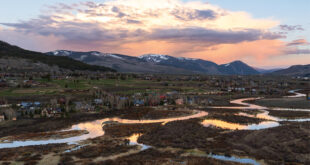(Editor’s Note: Alex Fenlon was the chairperson of the Crested Butte citizen’s committee appointed by the town council to make recommendations on the short-term rental situation in town.)
“You are running a business that just happens to be a town. It is what it is. “
This quote has been stuck in my head like a rusty chainsaw since I first read it in a letter submitted to the Town Council before last week’s meeting. In response to Mayor Michel’s proposal to limit short-term rentals to 90 days per year, the property management industry mobilized more than 40 second homeowners to submit letters telling the council that if they limit their ability to make money on their investments (the property they have purchased in Crested Butte), CBMR, real-estate values, and our economy, would all fail.
Money talks. And, as of this writing, your Town Council is listening.
Here’s a quick summary of the short-term rental situation in Crested Butte based on town numbers to get you up to speed. As you are probably aware, the global short-term rental industry is exploding, and we are riding the wave:
2005: 79 short-term rental units
2012: 130 short-term rental units
2016: 253 short-term rental units
That’s 27 percent of non deed-restricted housing.
HomeAway identified Crested Butte as one of the 10 fastest-growing markets in the country last year. However, unlike our peers such as Telluride, Boulder, Durango and Aspen, we have done nothing to regulate the industry, aside from a $10 pillow tax and a few zoning limits that are not always enforced.
The town participated in a CAST (Colorado Association of Ski Towns) study last year, and the council appointed a committee last spring to deliver recommendations, which were, aside from the parking, trash and noise content, ignored. Fair enough. That’s politics.
This committee was a valuable orientation for me into the political world. We had folks from all walks of life participate, and held deep conversations about the topic. I started out on a crusade for numbers—raw data that would tell me, without a shadow of a doubt, how many long-term renters have been displaced by STRs; the real estate value added to a house when it can be a short-term revenue producer; and ultimately, the magic number of STR licenses the town should allow.
Coincidentally, three councilmembers have expressed the desire for that same data. In the age of Big Data, how can we not have data?! Jesus, we know how many sage grouse are mating in Tomichi Heights right now.
We don’t have the data. I realized this title fight would come down to Money vs. Community Values.
Ouch. My money would be on the money in a first-round knockout.
Many STRs are operated by second homeowners who are vital to Crested Butte’s success. Absolutely. They contribute to this community in a variety of ways across the spectrum, and their value should not be minimized.
We have also realized that short-term rentals are a genius business model, kind of like finding out that the dirt in your yard is worth millions. Oh, right. It is. Kind of like finding a magic earwig in your basement that poops lift tickets. They are an easy answer to magically give us the bed base to accommodate the tourists we are dependent upon, without having to build a hotel like every other tourist town. And the maintenance ecosystem that springs up from the industry—snow plowing, lawn mowing, housecleaning, property managing—is bringing much-needed income to town. I have many friends who short-term their houses, and I have considered doing it myself. It is hard to make it as a full-time resident in Crested Butte, and getting some help with the mortgage, magic earwig or not, is a blessing.
In light of all that upside, there is a downside that is much harder to quantify. The community values I mentioned.
The fact that our residential neighborhoods are being transformed into business districts.
The fact that all those people who used to live here are no longer able to, because their former residence is now a business.
The fact that you don’t recognize the people in the parks or on the streets because lifestyle tourism is defeating neighbors and relationships.
The fact that you might regularly have to consider calling the police so your kids can get to sleep.
In this “sharing economy,” I believe that the best economic use of a house in Crested Butte is to run it as a short-term rental. Thus, any potential resident might be bidding against an investor—human or LLC—that sees that we are cheap, and they can knock out a big chunk of the overhead of ownership by picking up a license and having at it. This, to me, is why STRs should be limited. To retain the possibility that future full-time residents will be able to buy a house. Yes, of course they will need to be rich—the affordable housing conversation is an orange in this apple orchard—but the best case scenario for Crested Butte is to have as many residents as possible living in houses. I think that unlimited STRs are too powerful an economic force to succeed against.
So what to do? Big cities all over the world are struggling to crack this nut. While the committee’s recommendations weren’t perfect, we sought to keep it politically painless and achievable. What’s the best way to keep the benefits of short-term rentals, while protecting the people who make up the community? Let all primary residents short-term their houses. Maybe limit days, maybe not.
If it’s not a primary residence, charge a voter-approved fee that goes to affordable housing programs. Or tax them like businesses. You can figure this out. One STR-owning friend figures that our current real-estate values are a product of the quality long-term vision that has been in place here over the decades—building size limits, strict zoning, etc.—and keeping our community strong will actually increase housing values.
Our valiant seven council members knew this was a big issue when they decided to have a committee take a swing at it. The council is considering unlimited STR licenses, with each having a “limit” of 180 rental days per year. The busiest rental currently I’ve heard does 141 days.
Council: please don’t think you are addressing this issue. You are doing nothing. Still. You are being either shortsighted, naïve or lazy in kicking the can for some future council to deal with. Will the market correct itself? One of you posed that question, and admitted that you “don’t know” where it will end up. This industry is changing the model of home ownership in CB and nobody knows where it will peak. Another said dealing with this topic is “just too difficult.” You signed up for it. This is one of those topics that requires vision and an inner compass—not just kowtowing to threats. I know some of you have your eye on future governmental positions—keep in mind that accountability to your constituents matters around here.
To the residents of Crested Butte: So far, the seven stewards of your community are hearing from one side. Do you believe that what we have here is real? Is Crested Butte really “a business that happens to be a town”? A commodity, instead of a community? Should we all pull the ripcord, move to CB South and let Disneyland become fully operational? Do you want the council to “Listen to those of us who employ people and pay taxes,” as one letter commanded? Because they are.
Your council needs to hear from you. Call them. Stop them in the street and tell them to protect your community. Hey Crested Butte Housing Crisis: Facebook is for kids. Come to the council meeting on Monday, December 19, and tell them to their face.
-Alex Fenlon
 The Crested Butte News Serving the Gunnison Valley since 1999
The Crested Butte News Serving the Gunnison Valley since 1999





